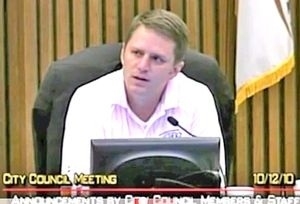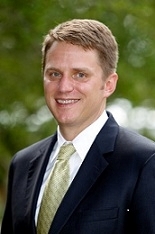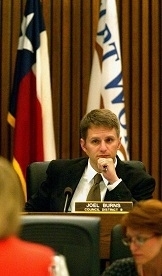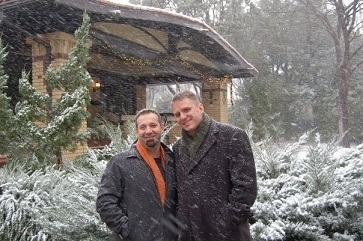 |
| Joel Burns telling his story... |
On October 12, 2010, openly gay Fort Worth City Councilman Joel Burns took his allotted time during the council meeting to talk about the epidemic of teen suicides due to bullying going on in the United States and around the world. He had no idea the media frenzy it would cause.
My Hero contacted him for a one on one interview and this is what he had to say about this disturbing crisis, his life, the importance of heroes and the support of family and friends.
MY HERO: In today's harsh political climate... where did you find the bravery to do what you did?
Joel Burns: I wish I had found the words sooner. Teen suicide, in particular LGBT teen suicide, is not a new problem. In the weeks leading up to my comments, I was heartbroken with each new story of a life lost. Each time, I thought someone should say something but I didn't. When Zach Harrington took his own life after being bullied for speaking out at his own city council meeting, I knew that I had to do something and that the right place to do so was from the Fort Worth City Council Chambers. So, that afternoon in one sitting I shared my own story that I had never told before, not to my husband or my parents. I hoped to reach kids right here in Fort Worth. I never imagined how far and how fast the message would travel.
MH: What would you say to people who have bullied? Is there a way back for them?
JB: First, we can't ever lose focus on the fact that it is not the youth responsibility to stop bullying. It is our responsibility as adults. Any conversation with those who have been bullies will be most effective if we remember bullying is a product of current culture. Education and speaking out when you witness bullying is crucial to cause a cultural shift.
To youth who have been bullies I would say, if you have a chance, apologize to those you have hurt and forgive yourself. In the future, speak up and stop bullying by others when you see it. To adults who have bullied I would say, acknowledge the pain you have caused and commit that you won't allow the children in your life to learn the same kind of behavior. Also consider sharing your own story as a bully and why it happened.
 |
| Joel Burns (Joel Burns) |
MH: Can you tell me about your childhood?
JB: I was born at the maternity hospital of the Gladney Center for Adoption, five blocks from our home in the Ryan Place neighborhood. I grew up on the O.C. Armstrong Ranch in southwest Fort Worth, where my paternal grandfather served as the last ranch foreman. Later we moved to Crowley where my maternal grandfather owned the local grocery store. Dad worked for TU Electric and with cattle part time. Mom managed the house, works as the Crowley United Methodist pianist and was the longest serving member of the Crowley ISD PTA. Daddy was the treasurer for the local family cemetery. Volunteering and being part of the community was the family was of life and something Mom and Dad instilled in me and my sister Robin and brother Cody. We have each found our own way of continuing that service as adults.
Crowley was a small rural town and I was surrounded by parents, grandparents and neighbors who loved me and looked after me. That did not mean that being different was not difficult and the pressure to fit in was a big deal. I know that because I had the love and attention of my parents and grandparents, I made my way through easier than so many.
 |
| Joel Burns at city council meeting (Joel Burns) |
MH: In your speech to city council you talk about things getting better. Can you talk about what has gotten better for you personally and in society?
JB: The truth is that for anyone in crisis, things get better the very next day if you just give yourself a chance to have one more day. For me, personally realizing that the love of my parents was constant and that you make friends that love you for yourself, if you can find the strength to be yourself, has meant that any small group or temporary bias I have encountered for any reason is not the whole world and life is full of possibilities.
In terms of societal changes, I think that expanded communication in every media across the world has allowed individuals to know that whatever might make them feel alone, they are never truly alone. There are people like them all over the world. This same exposure has meant that tolerance and role models of every kind are available to young African Americans who want to be the President of the United States or young women who want to be the Secretary of State or young gay men who want to be a realtor and serve on their local city council.
 |
| J.D. and Joel in the snow (Joel Burns) |
MH: When did you come out to your family?
JB: I came out my sophomore year in college. It was difficult at first for my family, but they quickly confirmed their love for me and we worked together so that they could understand what was a new part of my life to them, and so I could be open about what has always been true for me.
MH:What brings you joy?
JB: I love to learn something new, meet new friends and to travel.
MH: If you had the attention of the world for 5 minutes, what would you do or say?
JB: Life is really about a campaign for peace. Meet as many people as you can from every walk of life and you will be unlikely to think of those different than yourself as wrong or the enemy. Everyone has done or said something at one point in their lives that has hurt another person. It is important to recognize and I cannot stress this enough, that it is not the children's responsibility to stop bullying. I also recognize that the bullying does not always come from children, but from adults as well and that this behavior has to be stopped and called out as unacceptable.
MH: Who is your hero and why?
JB: My Heroes: My mother and father, Butch and Jeanette. My parents' unwavering love for one another first and me and my brothers and sisters provided me the strength every child needs to survive the perils of youth and continue to give me and J.D. (my husband) an extraordinary example of love, support and commitment.
Page created on 4/9/2011 11:41:56 AM
Last edited 9/1/2017 10:39:39 PM
